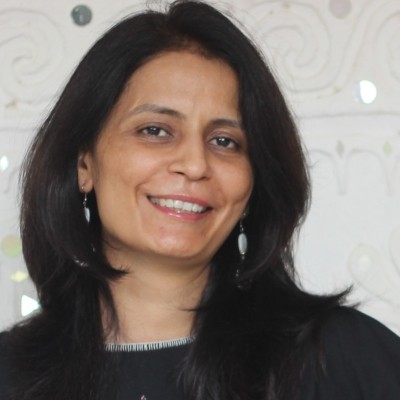|
Action for Impact
Dialogue with Ellen Tacoma, Shilpa Mittal Singh and Supriya Kapoor, Women on Wings
|
|

1 Women on Wings has a focused approach to building livelihoods for women in rural India.
Could you share with us the inspiration that led to the genesis of your organization? What are the key interventions that you are focused upon?
|
In 2006, our founders Ellen Tacoma and Maria van der Heijden found themselves in rural India for a management development program. They were profoundly impressed by the strength, resilience, and perseverance of the rural women, who managed their households and children while also yearning to contribute to and have a say in the distribution of household income. These women understood that investing in their children's education was key to breaking the cycle of poverty.
During their time in India, Ellen and Maria encountered local organizations focused on creating jobs for women. However, these efforts emphasized the product created by these women rather than the market or business aspects. Recognizing a significant gap, they returned home with a renewed passion to create an environment where these women could thrive. They realized that supporting Indian social enterprises with business knowledge could accelerate growth and generate additional jobs for women.
And thus, the spark was born with a single idea “to unleash the full potential of women in rural India through sustainable economic development”. They founded Women on Wings and committed to co-creating 1 million jobs for women in rural India.
From day one, our focus has been on creating jobs for women in rural India. And our interventions have always been on strengthening social entrepreneurship by providing business expertise in our partnerships with social enterprises and state government institutions.
|
2 You have worked extensively with social enterprises across the country. From your observation, what are some of the pressing and possibly lesser understood challenges that women focused enterprises face on ground?
|
Battling the patriarchal mindset in families or communities that restricts or prohibits women from taking up regular employment. There can be mental or physical pressure on women from joining the workforce and then continuing with it.
Women shoulder a disproportionate amount of care and household work; managing that with regular employment can be tough. A women focused employer will need to craft employment policies that take cognizance of this and at the same time ensure that work happens `as usual’. This becomes further complicated in cases of mixed employment. This aspect also creates problems for jobs that are not `work from home’. Managing production deadlines, maintaining quality standards becomes a problem.
Women have traditionally had less opportunities for education and training, potentially limiting them from adopting new technologies as readily as men. This can also become a mental barrier when preparing them for certain roles.
They also have less access, due to social and economic reasons, to technology and assets that can facilitate employment such as mobile telephones, own vehicles for transport.
When women start earning regularly, it can create gender power imbalance in families and possibilities of abuse, sexual harassment and other forms of gender-based violence, both on and off the workplace.
|
3 We observe an increasing interest from investors in developing a gender-lens to their investment thesis. However, the flow of capital to women-focused businesses is yet to emerge on a large scale, in India.
|
Women-focused enterprises in India need a mix of grants, patient capital and short-term loans with low interest rates across their life cycle. These businesses are usually unable to secure a short-term loan at a reasonable rate, and women especially are unable to meet the collateral requirements.
From your experience, what is the nature of capital that such businesses require across their life cycle? In what way, could investors align their thesis to create tangible impact?
Women focused entrepreneurs in India face deeply ingrained cultural practices that limit women’s time and movement due to care work and family responsibilities. Moreover, sexual violence and gender-based discrimination make it difficult for women to engage fully in business activities and grow their businesses. They also contribute to women’s unequal access to education, resources, and networks, meaning that women entrepreneurs start out on an uneven playing field. This fundamentally creates a lack of investment readiness amongst women entrepreneurs, perpetuated by a lack of capital. Investors need to realign their investment philosophies keeping these aspects in mind.
|
4 You work extensively with State governments and other ecosystem partners for implementing programs and projects. Could you highlight a few partnerships or programs that can help our readers understand the nature of ecosystem synergies that can be built for supporting social enterprises?
|
We usually identify gaps in business development and planning, areas that are not typically within the expertise of development sector professionals. They also lack exposure to marketing strategies, scaling, sales, technical skills, and practicality of running an enterprise. Additionally, management-level competency and tools for running impact-focused, business-oriented entities are often missing. This generates the scope of partnerships for planning effective operations and growth.
Entrepreneurs bring innovative ideas to address social challenges, which work best when there is a balance between social impact and business growth. Social impact remains the primary focus, but business profits help sustain operations and reach more communities.
Support organizations provide resources, business consultancy and expertise, mentorship, exposure to other players in the ecosystem, while balancing impact and financial sustainability through careful planning and strategic decision-making. Established companies in the same sector can assist in market linkages or provide access to larger markets for products and services of enterprises.
CSR programs offer employee volunteer expertise and financial support. However in certain cases, raising funds from investors becomes challenging for social entrepreneurs if they are inclined more towards the social aspect of the enterprise, which makes them less financially attractive.
Government organizations/ programs can lead in advocating supportive policies, simplifying legal frameworks for establishment and operations, providing training through research and skill-building institutes while creating an encouraging regulatory environment, carry out promotional initiatives for social enterprises, offer funding or tax incentives, and provide unutilized government infrastructure, schools or community buildings, as offices, storage, or operational spaces for the enterprises.
Engaging in such partnerships, which aligns with the mission of social enterprises and establishing common goals can leverage resources, expertise, and support, helping overcome challenges and maximize impact. These synergies also enable adaptation and innovation, allowing social enterprises to respond to market trends, customer preferences, policy changes, and organizational issues, enhancing their products and services accordingly.
|
5 Building businesses that can enable the ‘sustainable economic development of rural women, has many nuances. What are some of the aspects that businesses and entrepreneurs need to be mindful of, to ensure that the impact of their solutions is sustainable and scalable?
|
Adopt integrated and holistic approaches based on a framework that also focus on the broader conditions necessary for women to prosper economically.
Work with agencies that help women get equal access to and control over productive resources such as land and financial services.
Ensure access to minimum wages and linkage to relevant government schemes in public works
Work with the communities and families especially fathers, husbands and brothers and advocate for changing stereotypes and promote sharing of household work and care more equitably within the family, including addressing time poverty of rural women.
Provide or facilitate access to free or low-cost childcare and give paid maternity and paternity leave
Provide capacity building measures such as financial literacy, business training and financial linkage support
Work with local ngos that ensure greater voice, organization and representation for rural women
|
6 You also work with domestic and international donors that support your initiatives. From their perspective, what is the expectation they hold from grantee organizations, in terms of measuring and monitoring impact for women beneficiaries?
|
Most donors expect us to report on a yearly basis on the number of jobs for women co-created with our social enterprise partners and state government institutions. Our social enterprise partners fill an impact sheet and report the impact figures. Specifically for the state Government programs , we have engaged with a third party impact measurement organization that measures baseline and endline data to capture the outcome in terms of number of jobs created and increase in annual income for women in rural india. The result framework developed by one of our funding partners monitors our activities thoroughly.
What are some of the impact measurement metrics that enterprises can monitor, to achieve tangible impact?
- Total number of sustainable jobs for women
- Average annual income of the women
- Average number of hours worked by the women
- Increase in Turnover
|
7 Lastly, as you look to scale up your work, what are your focus areas in the near term? What nature of ecosystem synergies are you looking to build, for creating impact in women-centric sectors?
|
We continue to focus on High potential social enterprises that engage large scale beneficiaries and support in accelerating their growth , we see new areas like renewable energy and regenerative agriculture adding to livelihood creation. For state programs we aim to create a strong and sustainable state brand that can operate like a business entity , aggregate produce and sell through the brand , providing access to market for women producers , we aim to create private public partnerships that can lead to scale specifically in brand creation and development of value added products.
|
|
|

Ellen Tacoma,
Co-founder and Joint Managing Director

Shilpa Mittal Singh, Joint Managing Director

Supriya Kapoor, Director, Social Enterprises
About Women on Wings
Women on Wings provides tailor-made business consulting and mentoring to Indian social enterprises and state government institutions with ambition to scale and offer further job opportunities to rural women. A professional network of Dutch and Indian experts deliver targeted, on-the-ground and pro bono support in fields like strategy, finance, logistics and marketing so organizations become more stable, achieve real growth, and create more jobs and an income for women in rural India. It also organizes CEO summits and webinars to facilitate collaborative problem solving and networking. To date, Women on Wings has created over 395,000 jobs to unleash the full potential of women in rural India.
|
|
About Impact Investors Council:
Impact Investors Council, India (IIC) is a member-based national industry body formed with an
objective to build and strengthen the impact investing eco-system in India. To know more about our work visit https://iiic.in or reach out to secretariat@iiic.in
|
Disclaimer: Data and Information in this newsletter is made available in good faith with the exclusive intention of helping market and ecosystem players, policymakers and the public build a greater
understanding of the Indian impact investing market. The data is collated from sources believed to be reliable and accurate at the time of publication. Readers are urged to exercise independent judgment and diligence in the
usage of this information for any investment decisions
Some of the information provided in this newsletter is supplied by third parties. It is important that all users understand that third party information is not an endorsement of any nature and has been put together with the
sole purpose of benefiting stakeholders.
|
| Unsubscribe |
|
|
|







